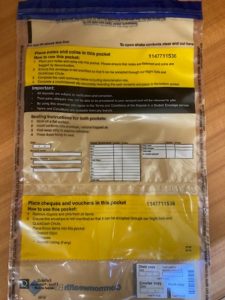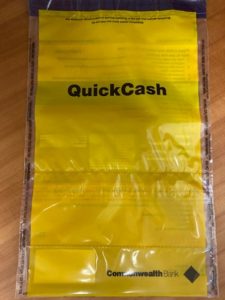NEW ACCOUNT
What do I need to do to open a new account?
If you are an existing Client
- and the proposed account will have the same authorised persons and operating authority as your existing account(s), then a signed letter of request (signed in accordance with the current account authority) to the CDF would suffice.
- and the proposed account will have different authorised persons and operating authority, then you will need to complete a separate Account Authority exclusively for the new account.
If you are a new Client, please contact the CDF on 9390 5213 and speak with the Lending & Relationships Manager
Does the CDF have an account specifically for the receipt of Electronic Funds Transfers and can the funds be swept into the main operating account?
Yes, it is generally sub-titled an EFT Receipts account and the CDF can automatically sweep the funds to the main operating account.
How do I deposit cash and/or cheques into my CDF account?
CDF deposits are only accepted at branches of the Commonwealth Bank. In all cases, you must use an encoded deposit slip from a deposit book issued by the CDF. For cash only deposits you can use the deposit slip only however for deposits which include cheques you must use a plastic ‘Quick Cash’ bag (see picture below) and place the deposit slip and cheques in the bottom section and cash (if any) in the top section.


How do I reset the password for MOTO transactions on my Essential Lite terminal?
Please contact the CBA Merchant helpdesk on 1800 230 177, have your merchant, terminal numbers and settlement account number at hand and be near your Eftpos terminal.
How do I change signatories/authorised persons on an account?
We can delete a signatory from a current Account Authority on the receipt of a signed request but if a new person is to be added then a new Account Authority form is required, please refer to our ‘Forms’ page. The updated form will need to be signed by everyone who is authorised to operate on the account as this supersedes all previous authorities. Please note new signatories/authorised persons are required to provide an Identity Verification form, also available on our ‘Forms’ page. Scanned certified copies of the identification are required for any new signatories.
How do I stop payment on a cheque or a direct debit?
To stop a cheque, log-in to CDF Online and complete the process to ‘Stop Cheque’. To stop a direct debit on your account, you must contact the Direct Debit User and request a stop to payments. If the Direct Debit User continues to debit your account, the CDF may be able to dishonour the debit. Please ensure you check your account on a daily basis and if a debit appears that you wish to dishonour, please contact the CDF immediately.
How do I close a CDF account?
You can request the closure of an account held with the CDF by providing a signed request. Please advise us of the recipient account details for any remaining balance in the account. If a cheque account is being closed, advise the last cheque number drawn, the last cheque number presented and request we cancel all remaining cheques. Any remaining cheques must be destroyed. Periodical Payments should also be reviewed and an advice issued to the CDF to transfer to another account, if applicable. You can provide the scanned closure request letter and all associated information via email.
How do I order a new cheque or deposit book?
Cheque usage and acceptance is continuing to decline as there are other faster and safer payment methods available. Please contact us to discuss ways to move away from your reliance on cheques. If you do require a new cheque book, please contact us to arrange at [email protected]
What is our BSB and Account number for arranging electronic funds transfers (EFT payments) from third parties into our CDF account?
Please log into CDF Online. Click on ‘Services & Help’. Then select ‘BSB Information’. The page will display the BSB which is 062784 in all cases and account number for each account you are authorised access to. In addition, the BSB and Account number are also displayed on the relevant CDF account statement and will soon be displayed on statements gained from CDF Online. Please note that the BSB and Account number printed on cheque and deposit slips are not valid for electronic funds transfer purposes and should not be used.
Why do the interest rates offered to depositors by CDF Sydney differ from those available on the open financial markets?
Often interest rates available on the open market are a function of risk and reward i.e. the higher the risk, the greater the reward. CDF Sydney operates in alignment with many Trustee Status funds. We are focussed on those type of investments that provide reasonable return whilst protecting Archdiocesan capital. Our Finance team tender all of our investments to ensure that we get competitive market rates.
With a view to supporting all of our Archdiocesan customers and stakeholders, Sydney CDF absorbs many of the account keeping fees and service fees charged by our Bankers, CBA. These include Merchant Fees (Archdiocesan Parishes only) and various other transactional fees charged across our accounts. The benefit of those fee waivers need to be taken into account when comparing investment rates available on the open market.
CDF ONLINE
How do I change or increase the external transfer limit on my account?
The external transfer limit on your account limits the total amount of all external transfers on any given day. Eg. If the limit was $50,000, multiple external transfers (to other banks) could be authorised on any given day up to a $50,000 total. This includes external batch totals. To change or increase the external transfer limit please either provide a new/replacement account authority to the CDF, or email a signed letter of request detailing the account and required amount limit.
Which Internet Browser does the CDF recommend to use for access to CDF Online?
The CDF recommends the use of Internet Explorer. Other browsers may not be fully compatible with CDF online.
What time is the cut-off for EFT’s (Electronic Funds Transfers)
2:30pm each business day. Commbank beneficiaries may expect same day settlement. Other banks and financial institutions would expect settlement the following day.
Where can I find help or assistance for functions within CDF Online?
CDF Online has its own help functionality. Simply click on the help button.
Is there an option for us to upload BPAY batch files to pay multiple creditors?
Unfortunately, the option to upload BPAY batch files is currently not available, however is being considered for development sometime in the future. You can however manually create a BPAY batch file and load individual creditor payment details into the batch for payments to multiple creditors.
MASTERCARD CHARGE CARDS
What should I do if I have detected a suspect or fraudulent transaction on my Mastercard Charge card?
Call the Commbank Corporate Card enquiry number on the back of your card – Ph 13 15 76
How do we cancel a lost Charge Card?
By calling the Commbank Cards Assistance on 131 576. Or alternatively download a MasterCard Charge Card Cancellation Request from the CDF Website www.sydneycdf.org.au complete the details on the form and email to CDF [email protected]
Does the CDF have access to an automated alert of fraudulent activity on Mastercard Charge Cards issued through the CBA which alerts cardholders to possible fraud activity on my card?
The Commbank does have an automated fraud detection system on its cards but as with all types of criminal activity, it’s an ongoing challenge to keep up with, and ahead of the fraudsters. Notwithstanding Commbank’s efforts to alert cardholders of fraudulent activity, it is the cardholders responsibility to monitor their card account and report suspicious activity.
The CDF on the other hand has a Card Management system whereby the Commbank has given us access to a system to order new cards and cancel existing cards. Whilst we can view transactions there is no automation of alerts to the CDF for possible fraudulent activity on cards issued via the CDF.
Our organisation has an Expense Management System (EMS) for Charge Cards, can the CDF arrange a Data feed into our EMS?
Yes the CDF can arrange this through the CBA. There is an application form which the CDF will be able to prepare on your behalf.
I have not received my monthly Charge Card statements. Who should I contact?
Sydney CDF can provide a transaction listing. Please contact [email protected]
INTERNATIONAL FUNDS TRANSFERS
How can we receive funds electronically from overseas into our CDF account?
The account details to be provided for arranging funds to be remitted electronically from overseas to your Catholic Development Fund (CDF) account are as follows:
| Swift Routing Number: | CTBAAU2S |
| (AUST) Account BSB: | 062-000 |
| (AUST) Account Number: | (please call the CDF for this account number on 9390 5200) |
| Account Name: | Catholic Development Fund Archdiocese of Sydney – Main Account |
| Bank: | Commonwealth Bank of Australia |
| Branch: | 48 Martin Place, Sydney NSW 2000 |
| Reference: (max. 18 characters) | (refer note below) |
Funds cannot be transferred directly to your CDF account, therefore funds need to be directed via our main CBA account (as per details above) and then they will be redirected to your CDF account using the reference details provided.
Note: As funds are being directed to our main CBA account, it is important that your CDF account number (e.g.2193 S52) is provided to the remitter and included as part of the payment reference so that we are able to link and redirect the deposit to your relevant CDF account. The payment reference should also include other relevant details to identify the remitter (i.e. remitter’s name), which will be used when redirecting the funds to your CDF account.
Please request the remitter of the funds, to provide you with a confirmation when the transfer has been processed, so that we can monitor our account accordingly.
In the meantime, if you have further enquiries relating to this matter, do not hesitate in contacting our office on 9390 5200.
FRAUD
How can I help to prevent fraud?
Unfortunately fraudsters are out to steal your cheques, steal your data, access your financial systems, disrupt your activities. If the worst happens, the losses could be significant. Your reputation could be tarnished, your normal operations interrupted or even temporarily halted. Here are some of the most common risks and how you can help to prevent fraud:
Direct Debit Fraud – The CDF recommends that under no circumstances account details be published on websites which includes documents attached to websites such as Parish Bulletins. In recent years, some of our customers have experienced un-authorised fraudulent direct debits against their accounts which are difficult to refund unless detected on the day of the debit. The practice of publishing account details on websites gives fraudsters an open opportunity to use a valid account number to process a direct debit against your account.
Stolen Cheques – Cheques are stolen in the mail or from letter boxes and mis-appropriated by changing the payee to a fraudulent name, banking the cheque into a fraudulent account and withdrawing the funds before the drawer realizes the intended payee has not received the cheque. Write cheques only as a last resort. The safest way of making payment is by EFT using CDF Online. If you must write a cheque, hand the cheque to the payee rather than mailing the cheque.
Stolen Credit Card Data – If you have accepted a credit card number for payment of services or donation, it is your obligation to keep that data secure. Once the payment has been made ensure any record of the credit card remains secure or encrypted. The full 16 digits should not appear on any paper records. If the data is stored on a computer ensure that computer is not connected to the internet or is safely encrypted.
Fraudulent Access to your Financial System – Hackers access systems by exploiting security flaws in software. Others do this by stealing or guessing log-in credentials or fooling people into sharing them. Aim to make your systems secure enough that hackers don’t bother with you because the effort is too great. Secure your Wi-fi, ensure system firewalls are up to date, use strong passwords and diarise to change them frequently. Never click on links contained in an email that is unsolicited or suspicious, no matter how genuine it may appear.
Fraudulent Credit Card Transactions – If using your credit card online, only ever purchase from sites you know and trust and never choose to store your number for future purchases. Never use public Wi-fi to make online credit card purchases. Monitor your credit card transactions closely and report any suspect transactions by phoning CBA on 131576.
Robin Hood Fraud – If you are a merchant using Bpoint Checkout to collect online donations then you may be a target for ‘Robin Hood Fraud’. Fraudsters use stolen credit card numbers to make $1 or $2 donations. Once validated, a fraudster may then use the number to make a large donation such as $1000. Then the fraudster makes contact and suggests that they only intended to donate $100 and ask for a refund of $900 to be made to another account that they can access. Be very wary of small donations and if the donor cannot be positively identified, always refund the transaction. If refunding a transaction always refund back to the originating card number. Be wary of any donations made by donors who are unknown to you. Set your minimum online donation to $10 or $20
CDF BENEVOLENCE
How does the CDF make a real difference in the lives of Sydney Catholics?
Since its inception in 1993, the CDF has returned over $18M in surpluses to Parishes. The CDF is also a Sapphire Sponsor of the Catholic Education Foundation which assists families in need to provide their children with a quality Catholic education. Surpluses generated by the CDF are helping to support the good works of the Church in areas such as Aboriginal Ministry, CatholicCare, Chaplaincies, the Confraternity of Christian Doctrine, the Ephpheta Centre and the Seminary of the Good Shepherd and others.


